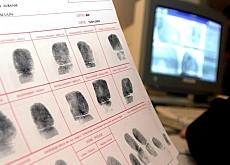The cost of staying out of Dublin

Many asylum seekers whose applications have been rejected in the European Union's Schengen area try again in Switzerland.
If voters opt to join Schengen/Dublin in a ballot on Sunday, Swiss officials will be able to identify quickly and at minimal cost whether an asylum seeker has already applied in another Schengen country.
Unofficial estimates suggest that approximately 20 per cent of asylum applications in Switzerland are second applications, according to the Integration Office.
Joining the Dublin accord, which governs asylum, would mean that the office no longer had to deal with the majority of these, thus substantially reducing administration and costs of the asylum system.
Dublin would give the Swiss access to the EU’s Eurodac system, which contains details of all asylum applications in the Schengen/Dublin countries. Accessing a file in Eurodac costs around SFr4 (€3); a pittance compared with the procedure involved in assessing and deciding on an asylum application.
Rejection
Last October the government, which is urging voters to support joining Schengen/Dublin, estimated that a rejection of the treaty would cost Switzerland an extra SFr80 to SFr100 million a year.
Three of the four parties in government support the treaties, with opposition to joining being led by the rightwing Swiss People’s Party.
Although the party wants to clamp down on asylum abuses and cut government spending, it maintains that Dublin won’t yield the promised benefits.
“The Dublin system is a fairy tale,” says People’s Party member Hans Fehr, who is also head of the Campaign for an Independent and Neutral Switzerland.
“It’s all well and good in theory but it’s totally different in practice,” he argues.
Fehr says that southern countries, such as Greece, Italy, Spain and Portugal which receive the majority of asylum applications are not supplying the necessary information to the Eurodac system.
Opposition
There is also political opposition from elements on the Left, who complain that the system “hunts down” migrants.
The Eurodac databank has also aroused concerns about data protection. “We did not fight against the file affair of the 1980s [- when the justice authorities kept files on people whose political ideas were considered suspect -] to start again now,” comments the Geneva-based Swiss Labour Party.
Negative spiral
For some on the Left, Dublin is to be welcomed because it removes some of the politics from the asylum issue.
“The development of minimum standards [for asylum] in Europe will stop the negative spiral in Switzerland, where processes are underway to make it harder for people to gain asylum, and to make the country less attractive to asylum seekers,” says Social Democrat parliamentarian, Hildegard Fässler.
Campaigners for asylum seekers’ rights tend to agree. They say that the infringement of privacy inherent in the Eurodac system is a price worth paying to achieve minimum standards in the treatment of asylum seekers.
The Swiss Refugee Council welcomes the fact that Switzerland would have to change its rules, if the country joins Dublin. Unlike the EU, for instance, Switzerland does not recognise non-state persecution as adequate grounds for granting asylum.
But the Council shares some of the reservations of the United Nations refugee agency, UNHCR, which says Europe is using Dublin as a barricade against refugees.
swissinfo
14,248 people made an application for asylum in Switzerland in 2004.
It is the lowest level since 1987.
In 2004, asylum was granted to 1,555 persons, while 10,080 applications were turned down.

In compliance with the JTI standards
More: SWI swissinfo.ch certified by the Journalism Trust Initiative



You can find an overview of ongoing debates with our journalists here. Please join us!
If you want to start a conversation about a topic raised in this article or want to report factual errors, email us at english@swissinfo.ch.